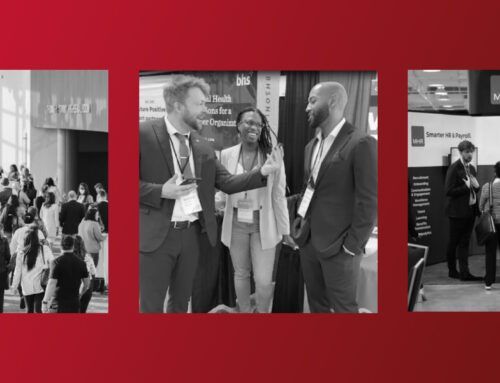By Joey Asher, President, Speechworks

Joanne McInnerney, VP, Human Resources at Novelis
In 2015, Novelis was underperfoming.
“We felt like we had the right strategy,” said Joanne McInnerney, the Vice President for Human Resources for Novelis, North America. “But the company’s overall performance was not in line with expectations.” That’s when Steve Fisher, the new CEO of the global aluminum products maker, tapped McInnerney to oversee a cultural transformation. The goal was to improve performance and strategy execution.
McInnerney admits that “cultural transformation” sounds like corporate jargon. But Novelis worked closely with the consulting firm “Partners in Leadership” – whose leaders authored “The Oz Principle” and “Change the Culture, Change the Game” – on a path to improve its culture and results. The company established a set of cultural beliefs, or key behaviors that are essential for its success, adopted accountability tools and trained all 11,000 employees.
Said McInnerney: “The CEO and our senior leadership team believed in the project and stayed on top of it. And it’s working.” Novelis is now executing the strategy and seeing success. Three years into the project, Novelis has record earnings, cash flow, and shipments. The culture transformation project fit with McInnerney’s formal education. More than 15 years ago, she obtained a Ph.D. in Industrial Organizational Psychology from Northern Illinois University near Chicago. “My dissertation focused on how to improve performance by engaging people,” she said. “I learned the theory in school. But now I get to experience what it really takes.”
She agreed recently to be interviewed about the Culture Transformation project.
What is culture?
Culture is the way you think and act to get things done. It includes the thoughts and actions that people take to go about their business. We had a great strategy. But the way we were doing things wasn’t optimizing that strategy. It was a perfect demonstration of [Management Guru]Peter Drucker’s famous quip, “Culture eats strategy for breakfast.” We knew we needed to think and act differently.
What made you think that the problem was culture?
The new CEO Steve Fisher did a listening tour and heard everywhere that we had gotten away from our roots, that our culture wasn’t what it used to be. What had the culture become? We had too much top-down decision-making. We were bureaucratic. There was not enough esprit de corps. Not a strong sense that the front lines could push back on leaders. We recognized individual heroes rather than teams of people. And when we didn’t perform, there were excuses rather than people and teams taking responsibility.
What did you want the culture to become?
We needed to move from a hide-the-bad-news culture to a say anything culture. We needed to be able to respectfully challenge each other. We needed to actively listen to different points of view and take in multiple perspectives before we make a decision. If something’s broken, that’s okay. Let’s talk about it instead of hiding it and hoping it will go away.
How did you define the culture you wanted?
We brought in the top 140 leaders of the company for a day-long program. Working with “Partners in Leadership”, we educated them on culture and accountability. As part of the day, we purposefully and thoughtfully defined our cultural principles. We landed on:
- Do it right: I safely deliver quality, cost-effective solutions to my customers.
- Say anything. I listen actively, speak candidly and challenge respectfully.
- Own it: I take accountability to deliver the Focused 5 (key business metrics).
- Get focused: I demonstrate discipline and follow through to accelerate flawless execution.
- Win together: I constantly reach out across boundaries to ensure Novelis succeeds.
How did you implement these principles with 11,000 employees?
We implemented a train-the-trainer program with employees who were nominated as “culture champions” all over the world. Then we did a four-hour culture training for all the employees. We taught them the premise of culture: that it’s the experiences, thoughts and actions that drive results. We taught what accountability looks like: that it’s about solving and doing, not blaming. And we taught that if we want to change our culture we’re going to have to change the experiences we create for one another. We also introduced three tools they can use every day: Focused recognition, a method for recognizing and thanking individuals and teams for demonstrating the cultural beliefs. Focused storytelling, which is another way to reinforce the positive behaviors and make the connection between our culture and our business results. And Focused feedback, the practice of soliciting and providing regular feedback between two employees. Then we role-played how to use these tools.
Can you give an example of how you’ve seen this work in real life?
An automation engineer and his team in China were struggling with getting a manufacturing line back up after an outage. Our automation team in Oswego, NY spent 10 hours on a WebEx with them, troubleshooting the issue until they were back on line. Consistent with our Cultural Transformation training, the Chinese engineer wrote out a Focused Recognition card (one of the tools we provided), took a picture of it, and emailed it to the Oswego automation team. It was an example of Win Together, one of our cultural principles.
How are you measuring success?
The cultural transformation was measured based on five performance metrics for the company. We call them the Focused 5.
- Safety
- Customer centricity
- Quality
- Operation experience
- Return on capital employed
We’re seeing marked improvement in all five areas. And after three years, we’re experiencing record shipments, record cash flow, and record EBITA.
What is the biggest challenge you’ve faced with the cultural transformation?
Staying the course. Focus. Focus. Focus. It takes real discipline to keep the agenda the same. You train. Retrain. And sustain. And there has been some resistance. People will say, “Oh, come on. They’re not going to write a Focused Recognition card on the shop floor.” But they will. And they do. Who doesn’t like being recognized for good work? There are also some challenges associated with traditions in certain cultures. For example, in Korea, it is difficult for employees to tell their boss that he or she is wrong. That goes against the country’s history and tradition. But with the right training, we let people know that at Korea Novelis, you can respectfully challenge your boss.
What’s next?
We are working to ensure that our systems are aligned with the new culture. So, let’s say you want an operator to be able to make necessary changes to improve a process. But then our system requires the operator to get eight approval signatures to make the change. That’s a system that contradicts a culture of empowerment. You have to be vigilant to ensure that your systems are properly aligned with the culture that you want. Our cultural journey continues with more work ahead, but we are off to a great start.
——–
Joey Asher is President of Speechworks, a communication and selling skills coaching company based in Atlanta. His latest book is “Riveting Data: How to Make Any Presentation Exciting Using Hollywood Storytelling Techniques.” If you’re interested in helping your team members speak simply about complex things, visit www.speechworks.net




